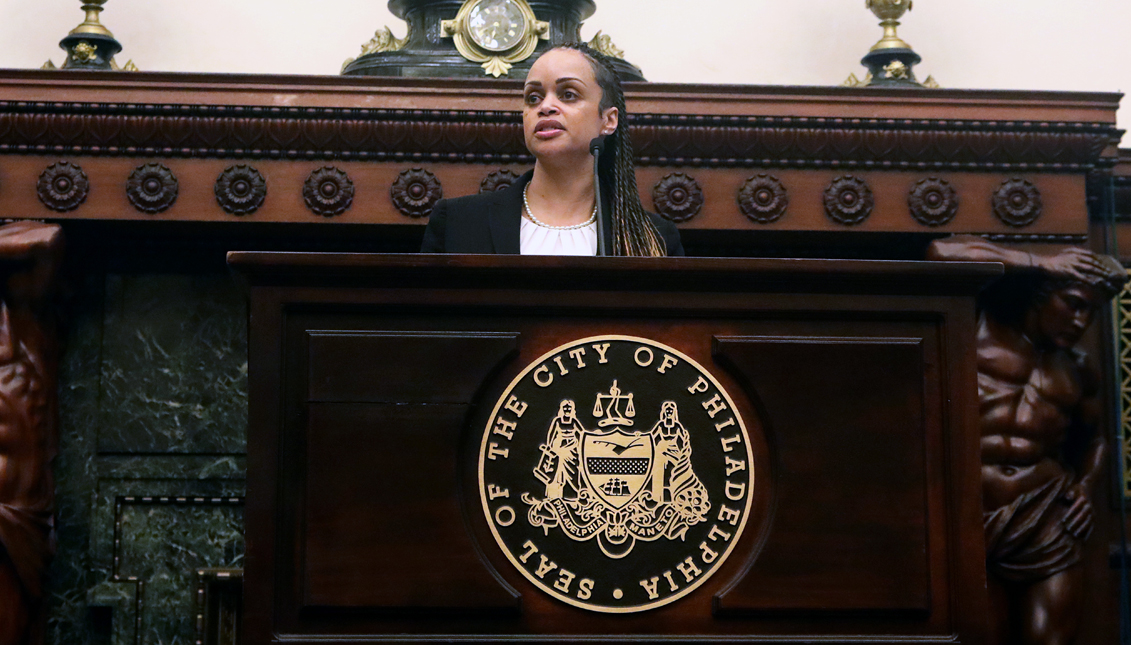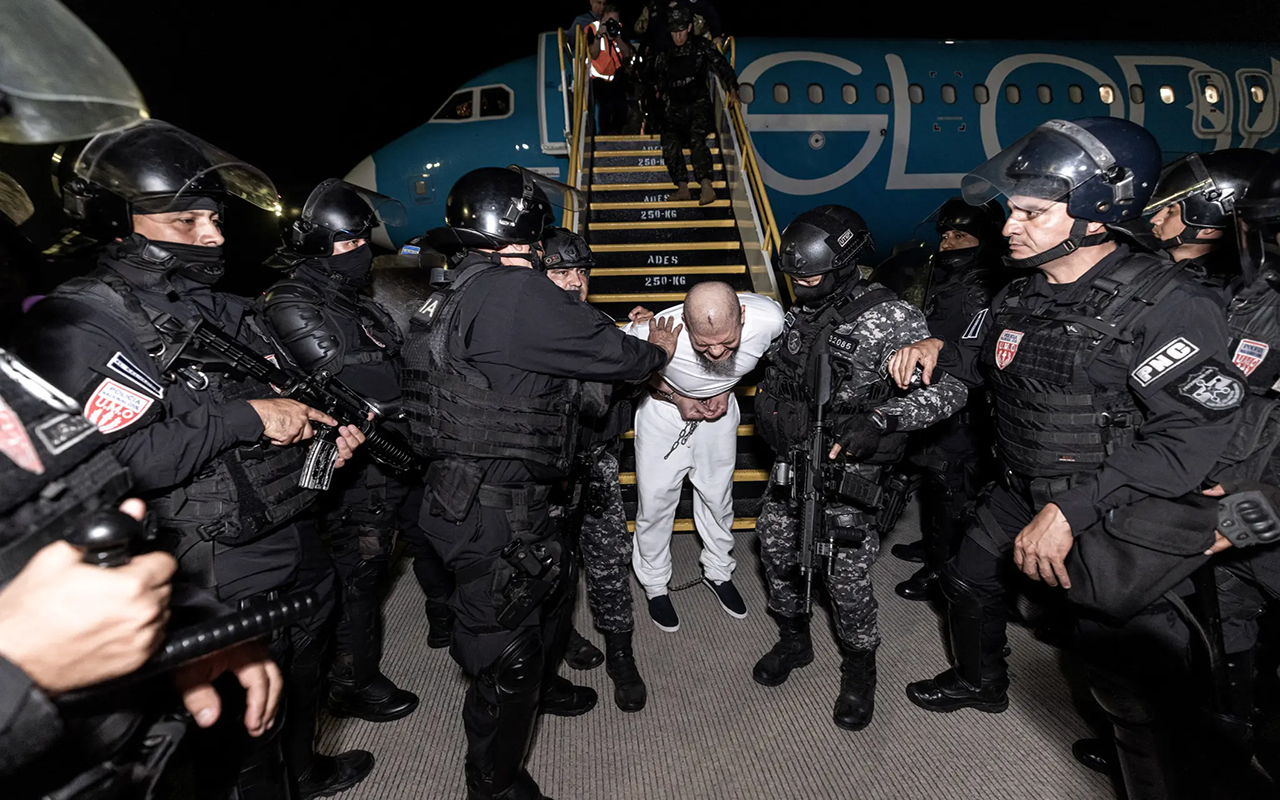
Why Not Me? Inside Danielle Outlaw's first year as Philly police chief
Philadelphia Police Commissioner Danielle Outlaw led the city’s police department into the pandemic, and she will lead it out.
Philadelphia Police Commissioner Danielle Outlaw told AL DÍA that she is very intentional about the jobs she puts her name in the hat for.
As one of the few Black women in police leadership across the U.S., Outlaw knows a thing or two about the “processes” cities go through when selecting their next law enforcement leader.
It’s often not genuine.
She reckons about 10 years ago is when words like ‘diversity’ began making rounds in police leadership circles. At that time, Outlaw was working in her hometown for the Oakland Police Department, rising up the ranks.
It made her a popular name for a number of positions opening nationwide, but she quickly learned many of those positions were already filled, and the selection processes were nothing more than shams to appoint who had already been picked.
“I was very intentional about not being in someone’s ‘process’ for the sake of them highlighting me as a qualified Black woman as part of their process,” said Outlaw.

When she was selected for her first police chief spot in Portland, Outlaw became the city’s first Black woman to lead its police department. The same history was made when Philadelphia Mayor Jim Kenney announced her appointment as Philly’s police commissioner on Dec. 30, 2020.
But to her it’s also not about the history she made.
“There’s still more firsts, and there’s going to be more after me,” Outlaw told AL DÍA.
In reality, the choice to become Philadelphia’s next police commissioner came down to a simple: “Why not?”
“Why not me?” said Outlaw.
“Why not me?” said Outlaw.
Philadelphia also presented her with a unique situation. Being the poorest major city in the U.S. set Philly apart “in a lot of different ways,” according to the commissioner. That situation allowed her to dive deeper into her passion for the psychology of people, groups of people, and the effect of systems on that psychology.
“I think this was a great place to land and I have no regrets,” Outlaw told AL DÍA a year and two months after assuming the position.
But regardless of passion, considering the year the Outlaw was walking into, “why not me” may sound like some famous last words.
“It was like Groundhog Day,” she said, looking back at her first year.
It all started in Philly for her on Feb. 10, 2020. That day, Outlaw was officially sworn in as police commissioner of the city.
The same week, Philadelphia broke 50 homicides in the new year, even surpassing the concerning pace of the year before, which ended with 499 homicides.

A little more than a month into the job, the first tragedy of many would strike. At 6 a.m. on Friday, March 14, 2020, a team of Philadelphia SWAT officers were serving a warrant to a house in the Frankford section of the city when they were met with gunfire from a group of men inside through the door.
Corporal James O’Connor was struck in the shoulder by a shot. He was transported to Temple University Hospital, where he succumbed to his wound 20 minutes later.
“That is something that any police commissioner hopes to never experience,” she said.
Dealing with an officer’s death in the line of duty was something Outlaw had only dealt with one time before.
Back in Portland, Outlaw could remember her first flag ceremony for a fallen officer. It’s something she still looks back as one of the few moments she lost composure.
A mother had lost her daughter, and it was Outlaw’s duty to present the flag to her. The mother kept it together until the moment the flag was handed to her.
“When she lost it, I lost it,” remembers Outlaw.
In her first year as Philadelphia police commissioner, she would present six flags for fallen officers, including O’Connor.
The others would fall victim to 2020’s next big tragedy, and one Philadelphia, the U.S., and the world is still working through: the COVID-19 pandemic.

For police, COVID-19 presented a reality completely counter to how their work was done before.
To Outlaw, policing is social interaction, hands-on, close quarters communication, and sometimes physical. Officers are also required on occasion to enter the unknown of people’s houses.
“All of the things that are counter to what COVID-19 restrictions or guidelines layout for us,” said Outlaw.
In other words, every protocol Philadelphia police followed in their day-to-day had to be reconfigured.
“We were literally building the plane as we flew it,” said Outlaw.
“We were literally building the plane as we flew it,” said Outlaw.
Early on, she also remembers the police department struggling like the rest of the country to find adequate supplies of PPE for its officers and other staff.
All the while, as society shut down, the homicide rate slowly rose across the city to unheard-of levels. Later studies would show Philadelphia’s circumstance to be the same as in many other major cities across the country, but in its first stages, many were just trying to grasp the gravity of the pandemic.
“At the time, no one was willing to come out and say that there was some causation or intersectionality between the increases of crime and the pandemic,” said Outlaw.
For her, the abrupt shutdown of society was especially hard given her newness to not only the position, but the city of Philadelphia itself. Not only was she unable to visit and get to know any of the city’s best restaurants or tourist spots, but also, Outlaw said the pandemic hindered her ability to make meaningful in-person connections within Philadelphia’s neighborhoods.
To this day, she said, most of her meetings still come in a virtual format.
In regards to the tourist spots, one in particular at the top of Outlaw’s to-do list was changed forever in her mind by yet another tragedy.

On May 25, 2020, Minneapolis Police Officer Derek Chauvin was captured on video kneeling on the neck of George Floyd for more than nine minutes. Floyd, a Black man, died as a result of Chauvin’s actions, and Minneapolis, Philadelphia and the world erupted at what it had witnessed.
“Those are videos you can only watch once,” said Outlaw.
RELATED CONTENT
She went on to explain that she had two reactions to watching the Floyd video, and the first was not as a police officer.
“I relate as a parent first,” said Outlaw.
She has two sons, aged 22 and 21 respectively.
“What if that was my child? What if that was one of my sons?” said Outlaw.
But even as a cop, she thought the case against Chauvin was “cut and dry.”
“That’s not what we do, that’s not what we train,” she said.
The jury in Chauvin’s trial also eventually agreed with her, and convicted the former officer of all counts that faced him, including second and third-degree murder, and manslaughter.
But before that, in the days that followed Floyd’s murder, Philadelphia became one of the many epicenters for uprisings. And its police, under Outlaw, were in the headlines for the wrong reasons.
In her interview with AL DÍA, the police commissioner admitted to understaffing for protests over the first weekend of demonstrations starting on May 30.
“There’s no secret about that,” said Outlaw.
“There’s no secret about that,” said Outlaw.
The protests during the day went off without a hitch, but the widespread looting and property damage that happened after and into the night was often too much to handle for the police force.
On June 1, Philadelphia police again found themselves in the country’s spotlight as police fired tear gas on protestors attempting to get off I-676, but were trapped by a tall fence that many began to climb.
A New York Times visual investigation of the incident brought a response from both Mayor Kenney and Outlaw, and a City Controller report released at the beginning of 2021 found that the commissioner had given the order to use tear gas.
The report also scrutinized the same tactics for their use in West Philadelphia, which was also highlighted in a video breakdown by the Philadelphia Inquirer.
Similar unrest would hit Philadelphia once again in the days following Oct. 26, 2020, as officers shot and killed Walter Wallace Jr. in Cobbs Creek.
In response to the uprisings and the many critiques leveled at her decisions, Outlaw much like she had about dealing with the pandemic.
“There was no blueprint for this,” she said. The unrest we saw in Philly and other parts of the country were not like regular unrest that people have seen before.”
Despite the situation, Outlaw also said she came out of it having learned how to respond better to circumstances of unrest and the like.
That approach is especially important when confronting the current crisis in Philadelphia surrounding gun violence.
Her main goal in combating the issue is working collaboratively with other offices and agencies to be as effective as possible in doing everything from solving cases to getting illegal guns off the street.
“We all want the same thing, but how we get there, there’s still work that needs to be done,” said Outlaw.
One of the areas she pinpointed for improvement is getting more punishments for people caught carrying illegal guns in violation of the Uniform Firearms Act (VUFA). The commissioner commended the work being done to confiscate guns and make arrests under VUFA, and expressed frustration that many of the shooters caught have one or multiple open gun cases.
“Maybe, just maybe, if there is disruption early… maybe they wouldn’t be that person carrying out the shooting today,” said Outlaw.
Solving gun violence is just one issue in a plethora that needs solving, but Outlaw has always billed herself as a change agent. That hasn’t changed after a difficult year.
“All hope is not lost,” she said.










LEAVE A COMMENT: